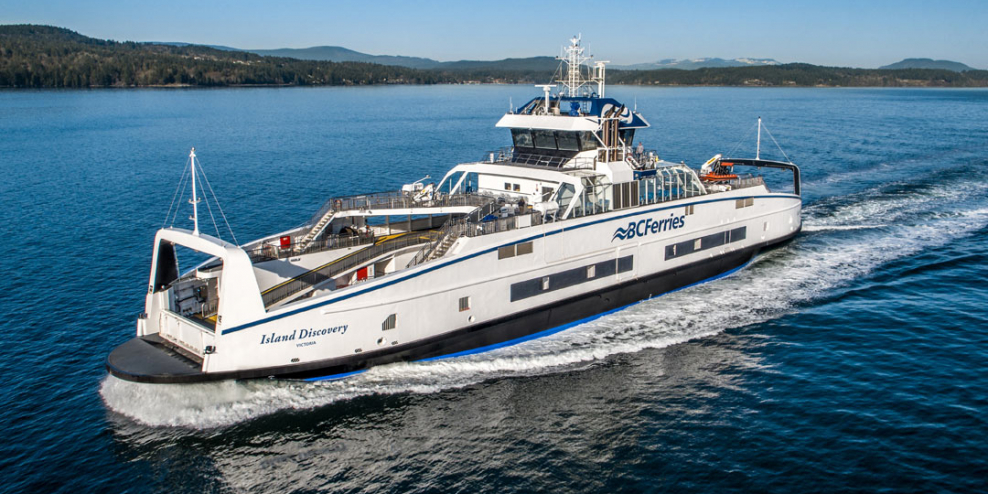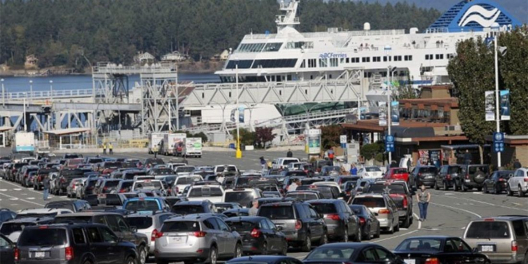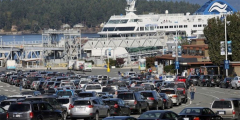Islanders know it’s “riders beware” when it comes to catching ferries lately. Last-minute cancellations have been rampant.
While the chaos may add spice to daily commutes, it definitely doesn’t help anyone get home in time for family dinner.
And it doesn’t seem to be ending anytime soon.
Erin McNeely is the president of the BC Ferry and Marine Workers’ Union. He warned travellers they could be in for “a rocky summer.”
“The fleet is running on overtime, and that’s just a recipe for burnout. We have been seeing that for months,” he told CTV News. “Unless there are some real fundamental changes taken quickly, it’s going to be difficult.”
BC Ferries has decided to bring back unvaccinated workers to increase staff (maybe not the best way to prevent cancellations due to illness?). But there are more issues with staffing that require a long-term fix.
BC Ferries has attributed recent cancellations to a “lack of staff.” But they don’t explain whether that lack is due to COVID illness or general hiring issues.
And which staff are they lacking? When they cancel a ferry, is it because they’re missing 8 crew in the lower decks or 1 captain?
In a recent press release, BC Ferries stated that the main reasons for low staff are an unexpected number of retirements and issues recruiting staff from overseas. They also said finding people to fill licensed positions was becoming the biggest issue.
So why are overseas staff so badly needed in a place with a young local workforce? And why aren’t local people getting licensed?
It turns out that these issues are a very long time in the making.
The International Maritime Organization started projecting a shortage of certificate holders for marine navigation back in 1979. They pretty much haven’t stopped since.
Retired BC Ferries mariner and former union official Trevor Oram told the Capital Daily that BC Ferries basically ignored the warnings.
“The corporation’s position was that it was such a fabulous place to work, that it would just take from the international maritime trade and grab the certificates that were out there floating around but developed by other organizations,” he said.
That’s not a great strategy to develop a long-term and renewing qualified workforce.
The warning bells continued (and are still being sounded to this day) from many different sources.
In 1996, a report by senior chief engineers at BC Ferries expressed the dire situation they were in. They had no one to replace a then-aging workforce. This prompted BC Ferries to set up an in-house development program to train people for engineering and deck positions.
Unfortunately, it was very short-lived.
When BC Ferries became a private company in the early 2000s, they scrapped the training program. Instead, management decided that recruiting already licensed workers was the easy way to go. Since then, they’ve streamlined the process of bringing foreign mariners into Canadian waters rather than investing domestically.
This instant gratification approach is the primary factor in BC Ferries’ current staffing issues. And ferry management and employees have known this for a long time.
A retired mate recently posted on the Facebook group for BC Ferries’ alumni, “I remember us telling the corporation in negotiations light years ago that they should be providing a proper training program so that people could move up the ladder from within the company. The line from Labour relations was ‘we can always hire what we need from offshore.’ Oops!!”
Other captains and workers echoed the same sentiment.
Upgrading the training and certifications of local ferry workers to help them move up the career ladder would create a long-term and renewing workforce.
COVID has also had an impact on workers and companies everywhere. But in this case, we don’t have the data to show how many key ferry workers are on leave because of Long COVID. That opens a whole other can of worms for a company where not even the staff wear masks.
But with staff stretched so thin, even a few workers taking time off to recover from COVID could cancel a ferry. It’s brought to light a problem that’s been ignored for decades.
BC Ferries is now discussing creating cadet and apprenticeship programs with the workers union. The goal is to build mariners rather than employees.
It’s great that BC Ferries is now “actively encouraging and supporting career development through financial aid and mentorship,” but getting licensed for some positions can take years.
Hopefully, these efforts will create a flow of workers that will eventually ease the staffing issues.
But change takes time. So last-minute cancellations may be the new normal for a good while longer.












